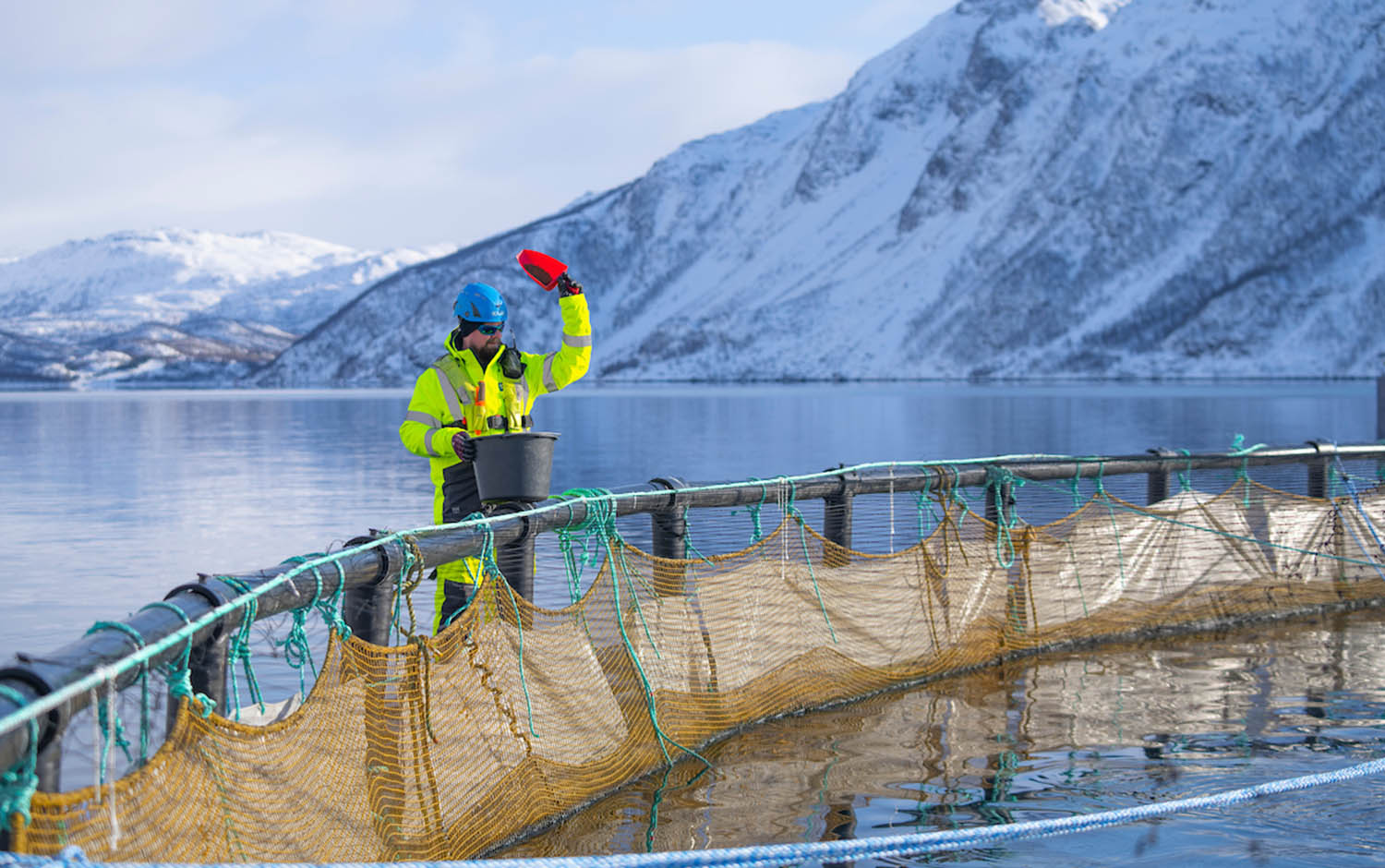SeafoodSource is closely following the sustainable seafood movement by compiling a regular round-up of sector updates about sustainability initiatives and certifications.
- The Global Salmon Initative (GSI) and World Wildlife Fund (WWF) launched a joint environmental, social, and governance (ESG) risk assessment tool tailored for feed ingredients.
The tool, which took three years to develop, provides a framework for farming organizations to collaborate with feed suppliers while properly assessing potential risks within the feed supply chain. These risks encompass a wide array of factors such as biodiversity loss, climate change, resource utilization, environmental impact, animal welfare, nutrition, human rights, governance, and more.
“Feed ingredient sourcing remains one of the main sustainability challenges in salmon farming, as well as food production more broadly,” WWF Aquaculture Lead Daniel Miller said. “The surprising amount of unknown information in feed ingredient supply chains leaves the sector open to unintentional risks and vulnerabilities, even for companies prioritizing sustainable, ethical production. With this tool, GSI members are taking a proactive approach to address these risks and identify opportunities to improve the supply chain. Looking at supply chains broadly and holistically doesn’t just mitigate risk; it also facilitates more informed and strategic decisions.”
The tool is currently in its initial phase and will undergo updates as companies start putting it in action by gathering insights into their supply chains.
“We know we need to improve the level of transparency and traceability in our supply chains – not only for our own knowledge but also to provide feedback and assurances to our stakeholders, whether they are customers, regulators, communities, or long-term investors whom we are sourcing from,” Grieg Seafood Director of Feed and Nutrition Tor Eirik Homme said. "By developing a common tool, producers can all ask the same questions of the supply chain, which will streamline requests and improve the level of traceability, ultimately supporting accelerated improvements in the sustainability of the ingredients being used for feed.”
WWF and GSI said they will conduct annual revisions to ensure the tool remains aligned with its intended purpose and continues to provide support effectively.
- A recent study conducted at the University of Tokyo suggests fish weight in the western portion of the North Pacific Ocean experienced a decline in the 2010s due to climate change, as warmer water temperatures constrained food supplies.
The research focused on analyzing the weight and overall biomass of 13 fish species and highlighted the impact of climate change on marine ecosystems.
The project compared data from the 1980s to the 2010s, in which researchers spotted the notable decrease in fish weight.
“We investigated 17 fish stocks – that is, populations or groups of fish – from 13 species and found that many decreased in weight during this period,” Professor Shin-ichi Ito of the Atmosphere and Ocean Research Institute at the University of Tokyo said. “With higher temperatures, the ocean’s upper layer becomes more stratified, and previous research has shown that larger plankton is replaced with smaller plankton and less nutritious gelatinous species, such as jellyfish."
The research aims to be a resource for fisheries management and policymakers to address climate change in Japan's seafood industry.
- Researchers at Oregon State University announced a new project focusing on enhancing the efficacy of oxygen-monitoring sensors and broadening their applications for the fishing industry. The sensors are designed for integration into fishing pots and serve as tools to convey data on oceanic conditions.
The project, which serves as a partnership with industry stakeholders and Indigenous communities, has received support in the form of a three-year, USD 1.2 million (EUR 1.1 million) grant from the National Oceanic and Atmospheric Administration (NOAA) Ocean Technology Transition program.
“This sensor has proven to be a vital and innovative tool for collecting important data about changing ocean conditions in areas that matter most to our local partners,” Oregon State’s College of Earth, Ocean, and Atmospheric Sciences Principal Investigator and Assistant Professor Jessica Garwood said. “This project is really about scaling up this technology so that it can be implemented and adopted more widely across the region and potentially globally.”
- Amsterdam, the Netherlands-based food company Corbion announced the launch of its Millennial Salmon project, presenting new ways to involve a variety of stakeholders across the salmon production value chain. The project found that its AlgaPrime DHA can be integrated into salmon feed at levels higher than the current industry standard, without compromising feed quality.
“The application of AlgaPrime DHA at different inclusion rates minimizes manufacturing process constraints due to its high omega-3 DHA content, optimal lipid level, ideal mixability, and thermostability, giving feed manufacturers a new tool to explore and develop omega-3 DHA inclusions and advance nutrition for health purposes,” Corbion Technical Application Manager Cristian Atienza said in a release.
The project has received funding from the Research Council of Norway, as well as organizations such as Nofima, InnovaFeed, Cargill, MOWI, Labeyrie Fine Foods, SINTEF Ocean, and Auchan.
- The Lenfest Ocean Program launched its 2024 Climate-Resilient Fisheries Webinar Series to broaden efforts to foster resilient ecosystems amid challenges posed by climate change.
The first session, titled “Advancing Climate-Resilient Marine Fisheries during the UN Decade of Ocean Science for Sustainable Development," took place on 31 January.
“The work in this portfolio aims to provide actionable information fisheries managers, policymakers, and stakeholders can use in management plans; operationalize conversations between scientists, managers, and stakeholders across regions; and demonstrate the value of use-driven research with co-design and sustained outreach,” the Lenfest Ocean Program said.
The portfolio seeks to educate the industry on the effects of climate change and its impacts on fisheries, fisheries management, and fishing communities. It will contain an array of subjects, including forecasting the relocation of economically significant fish stocks, assessing the vulnerability of communities to climate impacts, and offering recommendations for adaptive management, with attention specifically paid toward the United States and a few international locations.
The second webinar took place on 28 February, and was titled “Crafting Models to Predict Near-Term Fisheries Shifts Under Climate Change.”








